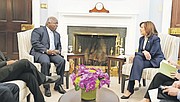With CHARLIE HARPER
WE are accustomed to viewing prominent Bahamian politicians on our own television broadcasts, listening to them on the radio and reading their words in our newspapers. Consequently, it’s always intriguing to witness the appearance of a predominant Bahamian figure in an unfamiliar, foreign context. On Tuesday, such an opportunity was afforded. We could watch and listen to Prime Minister Philip “Brave” Davis in an appearance in an unconventional setting at the Atlantic Council, a venerable Washington think tank that was founded in 1961.
The Atlantic Council manages 16 regional centres and functional programmes related to “international security and global economic prosperity,” particularly in the Atlantic Ocean basin. One of these programmes encompasses initiatives for the Caribbean, and the PM was appearing in connection with his current six-month term as Chair of CARICOM. The Atlantic Council has consistently proclaimed its non-partisan nature, with members “from the moderate internationalist wings of both parties” in the United States. The Council is independent of the US government and NATO. It relies heavily on donations, including from foreign governments.
The PM, elegantly clad in a navy-blue suit, spoke in measured, contemplative tones. In her introduction of the PM, the Atlantic Council moderator referred to his “expertise in corporate law”, and to the fact that Mr Davis has “appeared before the Privy Council more often than any other Bahamian lawyer”.
The PM’s message was both consistent and clear: The Bahamas faces serious crises arising from climate change, the impact of worldwide inflation, migration flows and energy insecurity. His appeal to his wider US and pan-Atlantic audience was unambiguous: The Bahamas needs financial and technical assistance to maintain and prosper.
In reporting to his interviewer on a private meeting he had held earlier in the day with US Vice-President Kamala Harris, the PM stressed The Bahamas’, and the entire Caribbean’s regional need for financial help. He noted that 57% of the English-speaking Caribbean population faced severe food security issues. Decarbonising national power grids, he reminded his audience, is an expensive process. The region needs loans and grants to continue with progress made so far.
Mr Davis lauded CARICOM-USAID long-term assistance plans. He lamented the loss of corresponding banking relationships, especially between Caribbean and US banks. He noted that several Bahamian islands have no commercial banking services available to residents.
He also issued a pointed reminder to his US audience: “It is said that nature abhors a vacuum. If the US is not close to us (in The Bahamas and the Caribbean region), that vacuum might be filled by a country the US has political issues with.” The PM did not mention China by name, but the implication was clear. He added that he was gratified that “the US appears to be in a process of re-engagement” with the Caribbean region.
Mr Davis also took a shot at John Ray, the US regulator who was appointed to oversee the bankruptcy of FTX. “He might have found that the Bahamian regulatory regime was more modern than that in the US,” the PM noted. Ray has made headlines criticising the Bahamian government’s regulation of the business activities of FTX, and the Davis government has responded vigorously to these allegations.
The PM also exhorted banks generally to focus less singularly on profitability and more on what he called “the common good.” He joined his predecessor prime ministers in lamenting the frequent application by international financial institutions of per capita income levels to loan and grant eligibility. The Bahamas has long suffered from the application of this metric. Mr Davis expressed hope that the forthcoming inaugural US-Caribbean banking forum would address at least some of these issues.
The PM’s message was clear. We can only hope that it reached and convinced decision-makers in Washington and elsewhere.
‘FAVOURABLE SIGNS’ FOR US ECONOMY
“It’s all about the economy, stupid.” This has long been a watchword in American political life. It means that whatever issues the two major political parties are emphasising, from abortion or gun rights to social justice to immigration, the real true central issue in national American elections is always how voters feel about their economic well-being.
“Are you better off than you were four years ago?” is a common refrain among pollsters and politicians trying to assess the mood of the electorate before major elections.
It was a misreading of the American public’s views on this fundamental question that led to another disappointing attempt by national polls to gauge voter preferences before the November 2022 election.
Nobel Prize winner, distinguished economics professor and New York Times columnist Paul Krugman this week offered an assessment of the real public perception of the American economy. It should be profoundly encouraging for the Biden administration.
Krugman used a device credited to eminent American macroeconomist and former chair of the president’s council of economic advisers Arthur Okun to illustrate his conclusion that the US economy is viewed by voters as stronger than previously thought, and that the signs are favourable for growth and prosperity ahead.
That’s also good news for us here in The Bahamas.
Okun’s device is called the “misery index”, determined by adding the unemployment and inflation rates at any given time.
Krugman said in his column that “I used to think this misery index was silly; there are multiple reasons why it shouldn’t make sense.
“But it has historically done a surprisingly good job of tracking consumer sentiment.”
Krugman notes that the misery index stood at 14 as recently as June 2022 – a big reason why the pundits were forecasting a “red wave” of Republican electoral triumphs in November.
“Now,” Krugman writes, the misery index has declined “to about what it was on the eve of the pandemic, when Donald Trump confidently expected a strong economy to guarantee his re-election.”
“Nor is that the only thing Democrats have going for them. The green energy subsidies in the Inflation Reduction Act are leading to investments in domestic manufacturing; it’s unclear how many jobs will be created, but the next two years will give Biden many opportunities to preside over factory openings, giving speeches about how America is, um, becoming great again.”
The Dems are certainly hoping Krugman is correct.
NFL PLAYOFFS CAPTIVATE THE COUNTRY
At a time when a near-fatal incident during an NFL game threatened the image of the NFL and cast a shadow over its wildly popular playoff schedule, the dominant US sports league delivered games last weekend that captivated the country and, together with the strong, continuing return to health of Buffalo defensive back Damar Hamlin, reignited America’s passion for its talismanic, violent sport.
Games that were expected to be blowouts counterintuitively became nail-biters. The Dolphins, prohibitive underdogs visiting Buffalo’s freezer without quarterback Tua Tagovailoa, rode an astonishing wave of mistakes by the hosts to what many observers feel should have been an upset Miami victory. Bills QB Josh Allen, now without his former offensive tutor who now patrols the sidelines as the New York Giants’ head coach, relapsed, became careless with the football and almost handed the opportunistic Fins the win.
You have to give the Dolphins credit for advancing to the postseason under dweeby-looking head coach and Yale graduate Mike McDaniel, who will get strong consideration as Coach of the Year and whose Miami hiring now looks much wiser than it did about a year ago.
Elsewhere, the Giants and head coach Brian Daboll upset the Vikings in the Minneapolis dome behind what might have been a coming-of-age performance by their quarterback Daniel Jones, a Duke graduate in economics.
The Giants now will move down the New Jersey Turnpike to face division rival Philadelphia in a fascinating game on Saturday evening that will either be a brutal war of attrition along the line of scrimmage or a wide-open shootout between inventive quarterbacks.
In other NFC games, the Dallas Cowboys benefited from a lousy performance by Tom Brady to beat the Bucs in Tampa, and San Francisco got a break in the California monsoon season to soundly defeat the Seattle Seahawks.
Speculation is now spiking about possible retirement plans for both Brady and veteran Green Bay Packers star QB Aaron Rodgers.
The Jaguars set comeback records in edging visiting San Diego, and Cincinnati needed a shocking touchdown run by a lumbering defensive lineman to beat the Ravens.
All four quarter-final games this weekend should be very entertaining.






Comments
Use the comment form below to begin a discussion about this content.
Sign in to comment
Or login with:
OpenID